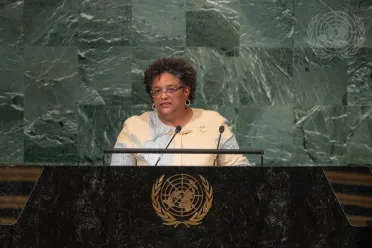Statement
Statement summary
MIA AMOR MOTTLEY, Prime Minister, Minister for National Security and the Public Service, and Minister for Finance, Economic Affairs and Investment of Barbados, underscored that: “A Security Council that retains the power of veto in the hands of a few will still lead us to war.” Therefore, the reform of the Council must not simply be in its composition but also be in the removal of that veto. Moreover, the recognition of the Group of Seven (G7) and Group of 20 (G20) countries as the informal subcommittee of governance in the world, if it is to be fair, must include the people of Africa and African descent. “How can a world have at its core a subcommittee that excludes more than 1.4-1.5 billion people of the world and expect it to reflect fairness and transparency in its decision-making,” she asked. Fairness will mean something only when it is reflected in the international community.
She went on to say that the international community must fight for reform so that citizens are not made victims of poverty as a result of the triple crisis of climate, pandemic and of the conflict that is leading to inflationary pressures. Voicing concern for the people of Haiti and the situation in the country, she stressed that any attempt to increase fuel prices in any part of the world by 150 per cent would have been met with great consternation by populations with fixed income. Similarly, she urged the same transparency to occur with respect to removal of the 60-year blockade against Cuba. Addressing the people of the United States, she said: “…there is nothing that justifies further hardship to people because of ideological differences.”
Noting that some are even benefiting from crisis disproportionately and egregiously, she asked whether the time has come for a review of the settlement of the Bretton Woods institutions that no longer serve the purpose in the twenty-first century that they served in twentieth century. “The century in which we live not only demands the eradication of poverty but also equally the protection of global public goods,” she said.
“If companies, multinational companies have contributed to the global public risk or benefit from the solutions from global public goods then they ought to contribute, through a small portion of their profits, funding the needs of countries whether on issue of climate resilience adaptation, biodiversity protection, public health, she added, noting other areas. She commended IMF for its rapid financing mechanism at the beginning of the pandemic and for the to be launched Resilience and Sustainability Trust — the first recognition that middle-income countries should be able to access funding irrespective of per capita income and dependent on climate vulnerability.
Full statement
Read the full statement, in PDF format.
Photo

Previous sessions
Access the statements from previous sessions.
